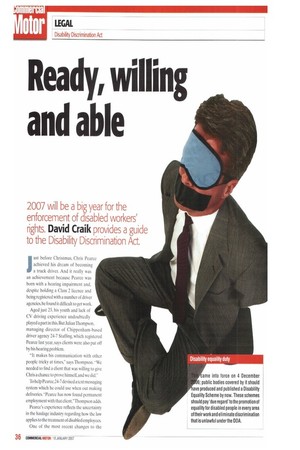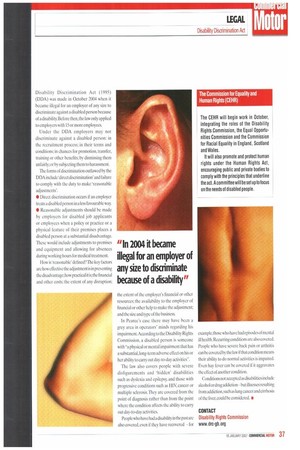Ready, willing and able
Page 36

Page 37

If you've noticed an error in this article please click here to report it so we can fix it.
2007 will be a big year for the enforcement of disabled workers'
rights. David Craik provides a guide
to the Disability Discrimination Act.
Just before Christmas, Chris Pearce achieved his dream of becoming a truck driver. And it really was an achievement because Pearce was born with a hearing impairment and, despite holding a Class 2 licence and being registered with a number of driver agencies, he found it difficult to get work.
Aged just 23, his youth and lack of CV driving experience undoubtedly played a part in this. But Julian Thompson, managing director of Chi ppenham-based driver agency 24-7 Staffing, which registered Pearce last year, says clients were also put off by his hearing problem.
"It makes his communication with other people tricky at times,says Thompson. -We needed to find a client that was willing to give Chris a chance to prove himself, and we did."
To help Pearce,24-7 devised a text messaging system which he could use when out making deliveries. "Pearce has now found permanent employment with that elient,"Thompson adds.
Pearce's experience reflects the uncertainty in the haulage industry regarding how the law applies to the treatment of disabled employees.
One of the most recent changes to the Disability Discrimination Act (1995) (DDA) was made in October 2004 when it became illegal for an employer of any size to discriminate against a disabled person because of a disability. Before then,the law only applied to employers with 15 or more employees.
Under the DDA employers may not discriminate against a disabled person: in the recruitment process; in their terms and conditions: in chances for promotion, transfer, training or other benefits; by dismissing them unfairly; or by subjecting them to harassment.
The forms of discrimination outlawed by the DDA include `direct discrimination' and failure to comply with the duty to make `reasonable adjustments'.
• Direct discrimination occurs if an employer treats a disabled person in a less favourable way • Reasonable adjustments should be made by employers for disabled job applicants or employees when a policy or practice or a physical feature of their premises places a disabled person at a substantial disadvantage. These would include adjustments to premises and equipment and allowing for absences during working hours for medical treatment.
How is 'reasonable' defined?The key factors are how effective the adjustment is in preventing the disadvantage;how practical it is; the financial and other costs; the extent of any disruption; the extent of the employer's financial or other resources; the availability to the employer of financial or other help to make the adjustment; and the size and type of the business.
In Pearce's case there may have been a grey area in operators' minds regarding his impairment.According to the Disability Rights Commission, a disabled person is someone with "a physical or mental impairment that has a substantial, long-term adverse effect on his or her ability to carry out day-to-day activities".
The law also covers people with severe disfigurements and 'hidden' disabilities such as dyslexia and epilepsy, and those with progressive conditions such as 111V, cancer or multiple sclerosis. They arc covered from the point of diagnosis rather than from the point where the condition affects the ability to carry out day-to-day activities.
People who have had a disability in the past are also covered, even if they have recovered — for example, those who have had episodes of mental ill health. Recurring conditions are also covered. People who have severe back pain or arthritis can be covered by the law if that condition means their ability to do normal activities is impaired. Even hay fever can be covered if it aggravates the effect of another condition.
Conditions not accepted as disabilities include alcohol or drug addiction—but illnesses resulting from addiction,such as lung cancer and cirrhosis of the liver,could be considered. is






















































































































































































